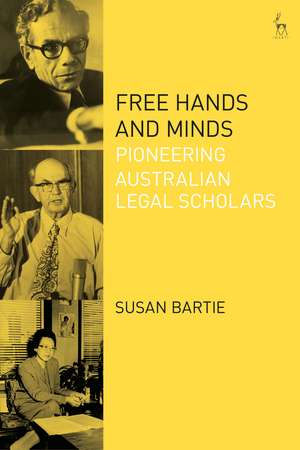Free Hands and Minds: Pioneering Australian Legal Scholars
Autor Dr Susan Bartieen Limba Engleză Paperback – 21 apr 2021
Preț: 266.48 lei
Preț vechi: 340.90 lei
-22% Nou
Puncte Express: 400
Preț estimativ în valută:
50.100€ • 52.68$ • 42.44£
50.100€ • 52.68$ • 42.44£
Carte tipărită la comandă
Livrare economică 25 martie-08 aprilie
Preluare comenzi: 021 569.72.76
Specificații
ISBN-13: 9781509951970
ISBN-10: 1509951970
Pagini: 344
Dimensiuni: 156 x 234 mm
Greutate: 0.48 kg
Editura: Bloomsbury Publishing
Colecția Hart Publishing
Locul publicării:London, United Kingdom
ISBN-10: 1509951970
Pagini: 344
Dimensiuni: 156 x 234 mm
Greutate: 0.48 kg
Editura: Bloomsbury Publishing
Colecția Hart Publishing
Locul publicării:London, United Kingdom
Caracteristici
Of interest to scholars of legal education, particularly in Australia, and those researching Australian intellectual history.
Notă biografică
Susan Bartie is Lecturer in Law at the University of Tasmania, Australia.
Cuprins
1. Introduction History and Legal Education Brett, Tay and Sawer Why Brett, Tay and Sawer? Feminism and Life History Concluding Remarks 2. Australian Legal Academics: A Short Intellectual History Introduction Law Professors and the Case for University Legal Education Tradition and Change - Founding an Australian Intellectual TraditionA Period of Change: 1950-2000 Conclusion PART APETER BRETT3. Brett and the Americanisation of Australian Law Schools Introduction Brett and the Melbourne Law School The Makings of a 'Liberal Humane Scholar' A Legal Process SJD Taking Legal Process Seriously Reception Concluding Remarks 4. The First Theory for Teaching Australian Criminal Law Introduction Brett and Waller Legal Process in the Australian Classroom Brett and the Australian Judiciary Reception Intellectual and Practical Obstacles Student Impressions Fracturing the Teaching Team Concluding Remarks 5. One of Australia's 'Pillars of Justice'? Introduction Orr Tait, Beamish, Ratten A Mixed Reception Concluding Remarks 6. A Professor of Jurisprudence The Last Professor of Jurisprudence at Melbourne 'The Most Urgent Contemporary Task' Conclusion - Peter Brett PART BALICE ERH-SOON TAY7. Morality and the Legal Academy Introduction The Makings of an Academic Warrior An Open Mind - John Anderson Possession The Sociological Tradition The Australian Legal Academy Concluding Remarks 8. Tay and the Department of Jurisprudence: Reigniting Hostilities Introduction Reigniting Decades of Division Origins of the Division Tay's Appointment 9. Tay and the Department of Jurisprudence: Stone's Successor Introduction Tay's Credentials Tay and Stone - Different Sociological Traditions A 'Beachhead' for Jurisprudence The Antidote New Protagonists Concluding Remarks 10. Tay and the Department of Jurisprudence: An Academic Entrepreneur Introduction The Rise of an Academic Entrepreneur Motivating Principles The Heart of the Department Concluding Remarks 11. Critic of Australia's Legal Academy Introduction Critique of Australian Legal Education and Scholarship Feminist Legal Scholarship Conservative or Liberal? Limiting Tay's Legacy Conclusion - Alice Erh-Soon Tay PART CGEOFFREY SAWER12. Politics, Law and Society Introduction University Life and Politics Traditional Underpinnings Concluding Remarks 13. A Case Against Law's Autonomy Introduction A Smorgasbord of Legal Theory Sawer's Constructive Legal Realism A Response to the Realist Dilemma Bank Nationalisation Australian Federal Politics and Law Strengthening the Doctrine of Precedent 'We're All Socio-Legal Now' (and Always Have Been) A Middle Ground Concluding Remarks 14. Sawer and the Research School of Social Sciences Introduction Sawer's Appointment to a World-class Australian University The Department of Law Early Ambitions Dean of the RSSS Entrepreneurial Qualities Strengthening International Networks Recruitment Doctoral Students Concluding Remarks 15. Sawer and the Future of Australian Academic Law The Path Not Taken What Might Have Been What Occurred 16. Conclusion Learning Lessons Lives and Careers Local Conditions The Heart of Australian Law Schools Law Schools and Society
Recenzii
[W]hile it is unquestionably a work of impressive scholarship, it is also a timely meditation on the role of legal education and the discipline of law in Australia. Free Hands and Minds makes compelling claims about the important place of Australian law schools in our society. a provocative and really masterful work but just as importantly, a terrific read.
A superb contribution to legal life writing and the transnational history of legal education and scholarship. Bartie's accomplishment is to recover the lives, contributions and times of three very different marginal figures who played a leading role in the broadening of academic law in Australia. One of the many virtues of this wonderfully novel book is the way that it illuminates the relationship between their scholarly activity, politics and the growth of the discipline of law; the importance of international networks of legal scholars embracing America, Australia and Britain; the variety among "progressive" legal scholars; and the significance of gender. In the process, Bartie offers vital insights, while highlighting some of the intellectual, institutional and moral confines of the discipline of Law.
Susan Bartie's excellent new book...has applied a genre of legal scholarship that has been much neglected. The result is a new understanding not only of the discipline of law in Australia but also of the ways individual intellectuals have shaped their educational and professional environment.
A superb contribution to legal life writing and the transnational history of legal education and scholarship. Bartie's accomplishment is to recover the lives, contributions and times of three very different marginal figures who played a leading role in the broadening of academic law in Australia. One of the many virtues of this wonderfully novel book is the way that it illuminates the relationship between their scholarly activity, politics and the growth of the discipline of law; the importance of international networks of legal scholars embracing America, Australia and Britain; the variety among "progressive" legal scholars; and the significance of gender. In the process, Bartie offers vital insights, while highlighting some of the intellectual, institutional and moral confines of the discipline of Law.
Susan Bartie's excellent new book...has applied a genre of legal scholarship that has been much neglected. The result is a new understanding not only of the discipline of law in Australia but also of the ways individual intellectuals have shaped their educational and professional environment.
